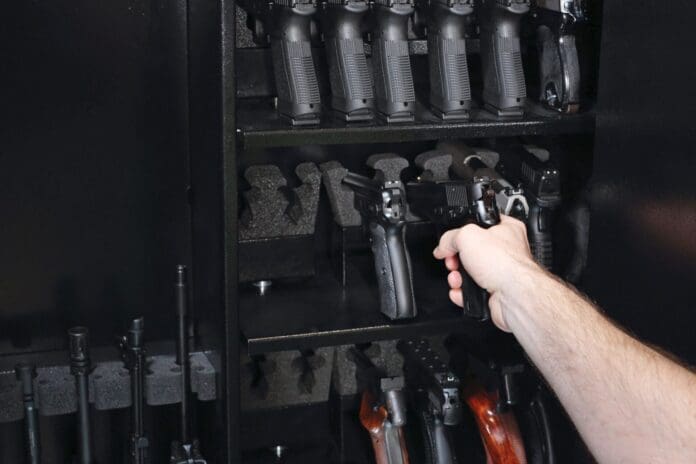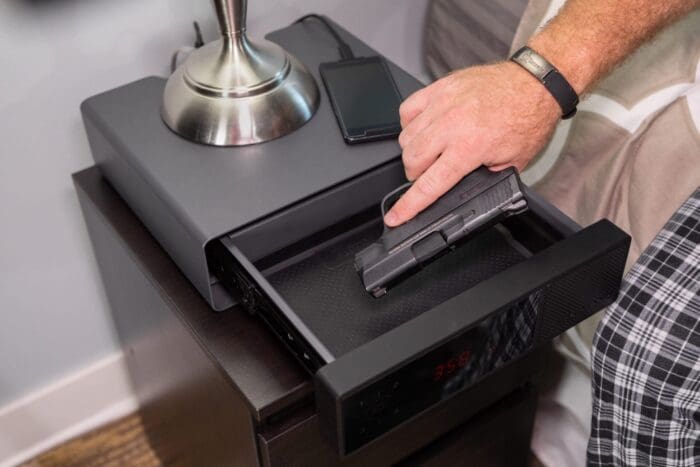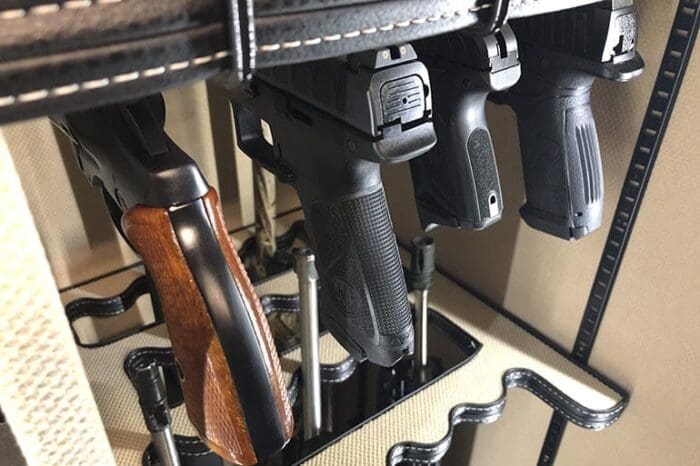
While details of the attempted assassination of former President Donald Trump and ensuing investigation continue to trickle out through the media, news on the actions and possible motivations of the shooter remain scarce. Initial reports indicate the AR-style rifle the 20-year-old gunman used was one that his father had legally purchased in 2013 from a gun shop that is now out of business. The suspect, Thomas Matthew Crooks, was still living with his parents in Bethel Park, Pennsylvania, just over an hour away from the scene of the attack in Butler, Pennsylvania.
It is not known if Crooks had permission to have the firearm or if his parents were aware that he had it, but Fox News has reported that his parents, who are said to be fully cooperating with authorities, did call police the day of the shooting concerned because their son was “missing and they were worried.”
The report goes on to say, “It’s unclear what his parents told authorities.”
It is only speculation at this point, but it’s not unreasonable to wonder if they realized their son—and a firearm—were both missing, a combination of factors that spawned them to call authorities. Regardless of whether Crooks had permission or not, the outcome was a bad one. It is a situation that underscores the critical importance for gunowners, particularly parents, to keep their firearms safely and securely stored to prevent unauthorized access to them by children in the home, guests or intruders. It’s also a reminder to always make sure they are cautious about whom they grant access to those firearms as well.
“We don’t know what happened here, though it possibly hints at a case of unauthorized access. We just don’t know yet,” says Tom Kubiniec, CEO of SecureIt, a leading provider of safe gun storage solutions. “But when you look at all the data and statistics, if all the guns in America were properly secured, you’d have a lot of tragedies prevented each year.”
Safe Storage Is Easy…And Affordable
Kubiniec explains that when he says, “properly secured,” he means out of sight. He’s not a fan of trigger locks but admits if you don’t have anything besides one to secure a firearm then you should use it.
“They make it harder for you to access the gun when you need it quickly,” he says. Keeping a firearm merely hidden in a closet can also make it hard to access at a time of need should you be in another room or if it is in a standard gun case or hidden behind other items like clothing. Smaller biometric or fast-access safes for handguns like SecureIt’s Fast Box Model 20 or modular lock boxes designed for long guns such as their Fast Box Model 40 can be discreetly hidden in various spots about a home and accessed in seconds when a firearm is needed. Safe gun storage also doesn’t need to be expensive.
The company’s Fast Box Model 20 has room for four guns, can be accessed in mere seconds and costs just $178. Smaller handgun boxes such as SentrySafe’s Digital Gun Safe for a single handgun can be had for $100 while a basic lockbox for a single handgun from Hornady that can be secured and kept under combination lock is only $40. The price goes up for long gun storage, simply because of the larger size, but is still reasonable when you consider the risk. The SecureIt Fast Box Model 40 sells for $299, but no-name brand metal and lockable gun cabinets on Amazon can be had for as little as $90.
“A properly secured gun in a fast-access safe will provide faster access than a gun a in a closet,” Kubiniec says.

Safe Storage Laws
Safe storage isn’t just good, responsible policy in the home, particularly where children are present, but it may actually be required by law. Currently, 26 states have adopted some form of child access and/or secure storage laws, according to Everytown for Gun Safety, an anti-gun group funded by Michael Bloomberg. But Pennsylvania isn’t one of them.
“There are no such laws in Pennsylvania,” says Michael Giaramita, a Pennsylvania attorney who founded The Gun Law Firm and wrote Pennsylvania Gun Law Armed & Educated. “However, under 18 Pa.C.S. 6142, a licensed dealer is required to sell or provide a locking device to the transferee of any “firearm” excluding antiques. Because of the way “firearm” is defined under Section 6102, this relates mostly to modern handguns. The requirement does not apply if the design of the firearm incorporates a locking device. There are no requirements as to what must be done with the locking device after the transfer.”
Groups such as Everytown have championed these laws, but the effort is not without controversy and criticism. While, gun rights groups also encourage safe storage and responsible gun ownership, they generally oppose codifying such requirements based on the grounds that they can unnecessarily criminalize citizens through laws that can be difficult to enforce and are little more than governmental overreach into people’s private lives.
“The problem with these laws is the government regulating gun ownership flies in the face of our freedoms,” Kubiniec says. “Government regulation is never going to be good. It will start with wanting laws that require you to lock your guns but will expand into requirements on how to lock them and ultimately make it difficult to access your firearms when they are needed.”
The National Shooting Sports Foundation (NSSF) recently promoted their “Gun Storage Check Week,” through retailers and the media to highlight the importance of reminding “firearms owners to review their storage practices with the goal of preventing unwanted access to their guns.” Gun Storage Check Week was observed June 1-7.
“Securely storing guns when they’re not in use can save lives. It’s really that simple,” says Joe Bartozzi, president and CEO of NSSF. “No one wants their gun in the hands of an unsupervised child, a person in crisis, someone who does not understand how to safely operate firearms or a thief.”
Of the states that have passed secure storage laws, Michigan’s caught the most attention recently as it went into effect Feb. 13, 2024, on the one-year anniversary of a shooting at Michigan State University that left four people dead and five wounded. On the first day after safe storage requirements went into effect there, Michael Tolbert, 44, was charged under the law after his 3-year-old daughter accessed a firearm and accidentally shot herself in the head. Just over a month after passage, grandparents Karl and Theresa Robart, were charged with violating gun storage laws when their 5-year-old grandson was shot and killed after his 6-year-old cousin got ahold of a gun in their home.
For Tolbert’s part, he was a convicted felon and already illegally possessed the firearm his daughter, Skye, accessed, so it’s not clear how the new laws will actually influence both legal gun owner and illegal gun owner behavior.
Michigan’s safe storage law also took effect just a week after Jennifer Crumbley, the mother of 15-year-old Ethan Crumbley, who committed a mass shooting at a high school in Oxford, Michigan, in 2021 that left four people dead, was found guilty of manslaughter for her son’s actions. In the trial, Jennifer was found guilty of providing the firearm to her unstable son that he used in the shooting. Her husband and the boy’s father, James Crumbley, was found guilty on the same charges a month later. The case is notable as it marked the first time in U.S. history the parents of a mass shooter were held liable for their negligence in allowing access to a firearm. Their son had already been sentenced to life in prison without the possibility of parole.


With Rights Comes Responsibility
Even in states without safe storage requirements, a parent who negligently allows their child to access their firearms and then the child commits a crime with that firearm, could find themselves in serious legal trouble similar to the Crumbleys. At the very least, such as in Pennsylvania, they may find themselves open to a serious lawsuit.
“If parents were to be sued, these cases are evaluated based upon a general negligence standard. Courts have gone through this in multiple contexts. In Johnson v. Johnson, a father provided his son with a gun that was later used in a fatal hunting accident. The Superior Court concluded that the father could be held liable. In Mendola v. Sambol, a father left a gun out and his eleven–year–old son used it in the shooting of another young child. The Superior Court concluded that he too could be held liable. In that case, the Court noted that ‘it is negligent to place loaded firearms or poisons within reach of young children or feebleminded adults,’” says Giaramita, who is also an independent program attorney for U.S. LawShield, a company that provides self-defense insurance products for gunowners and educates them on safe, legal gun practices.
When it comes to safe firearms storage, Giaramita says from a legal standpoint it is not so much “why” as “when” it is a good idea.
“I would lean more towards the importance of preventing access from those who do not have permission and being cautious about to whom one grants permission. If your negligence puts a gun in the hands of a child, a feeble-minded adult or anybody with bad intentions, and something horrible happens, you should expect to be sued,” says the attorney. And even if you avoid jail time in states where you may be subject to criminal charges or a hefty payment, defending yourself could take years and countless dollars paying legal fees that can leave you financially drained.
“If all gun owners would take that responsibility seriously, we could put this issue to bed,” says Kubiniec. “If every gun owner kept their guns secured, this issue goes away.”
In a best-case scenario, you ensure nobody is ever hurt from your firearm and possibly your child doesn’t make a life-ending or altering mistake. In a worst-case scenario, you must deal with the aftermath of innocent lives lost, the possible death of a child or other loved one or at the extreme end of the scale, the course of a presidential election and American history irrevocably altered, the negative fallout of which could be felt for generations. It’s really a pretty easy decision to make.
Editor’s Note: All product and gun reviews are performed independently and product mentions made based on the quality of the product and value of interest to gun owners. We offer links to mentioned products as a convenience to readers interested in learning more about each product, as well as to provide a fast, easy way to purchase that item if desired. Please note when you buy through links on our site, we may earn a commission to help support the costs of operating our site and keeping it free for our visitors.
Read full article here

